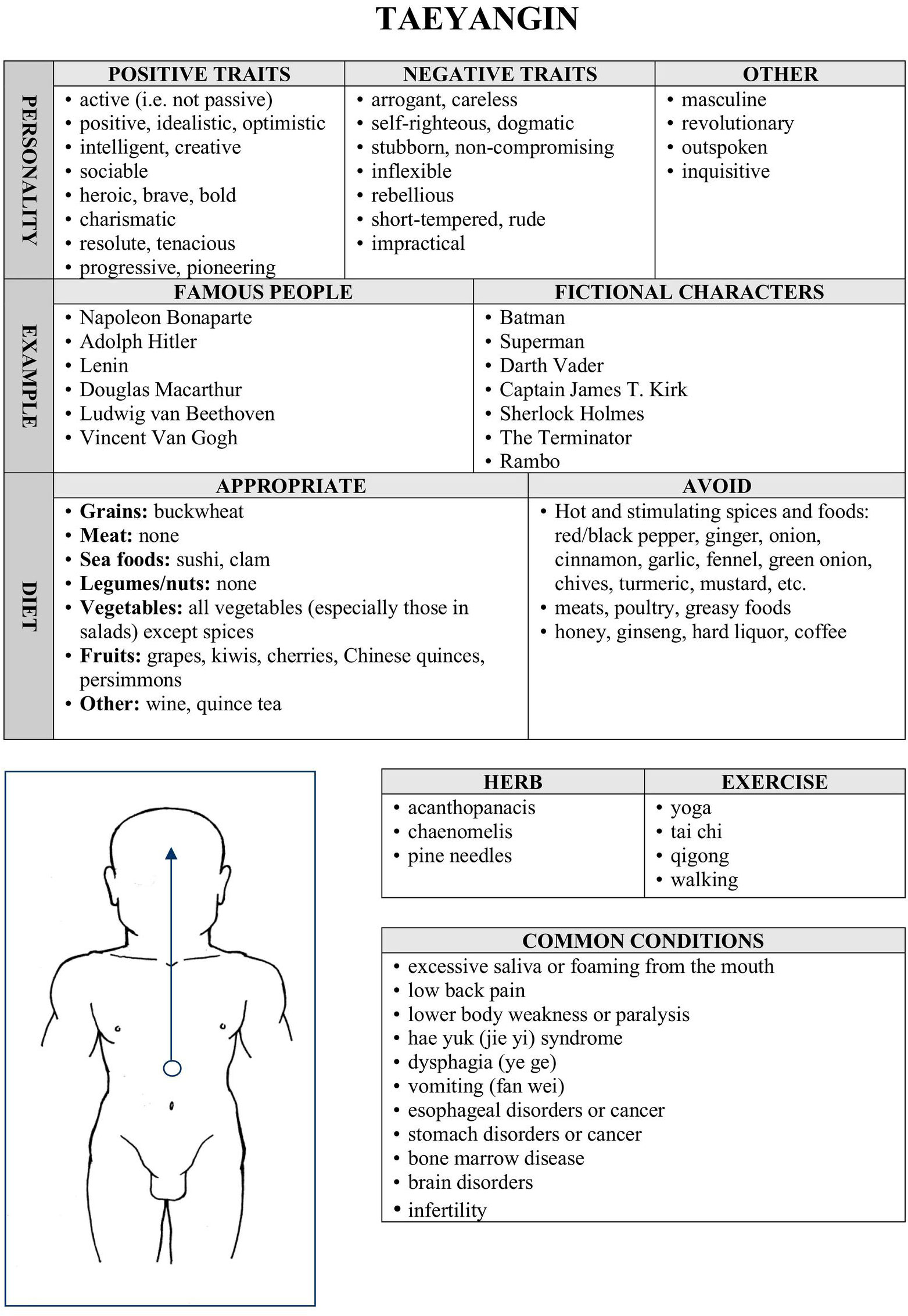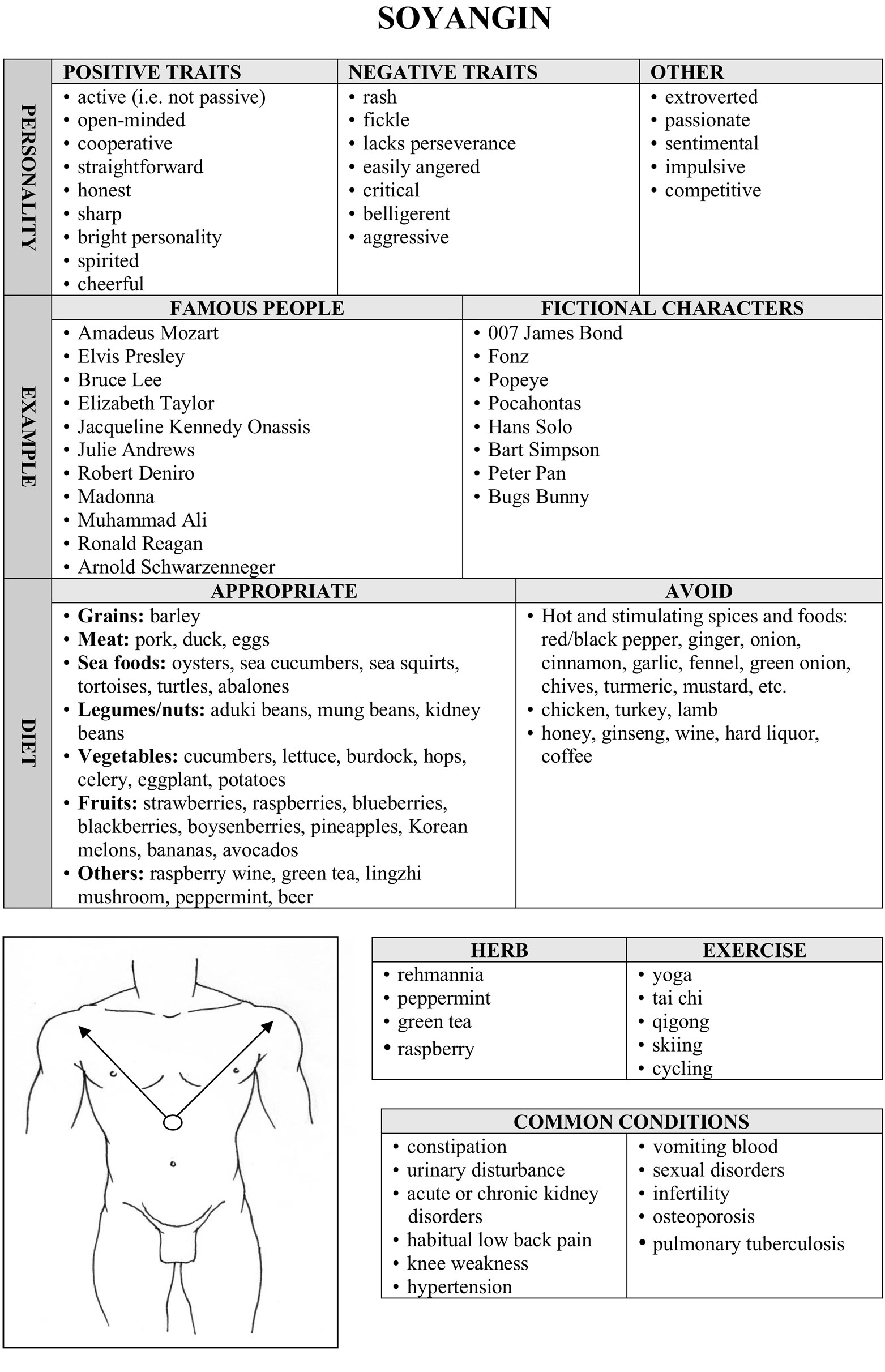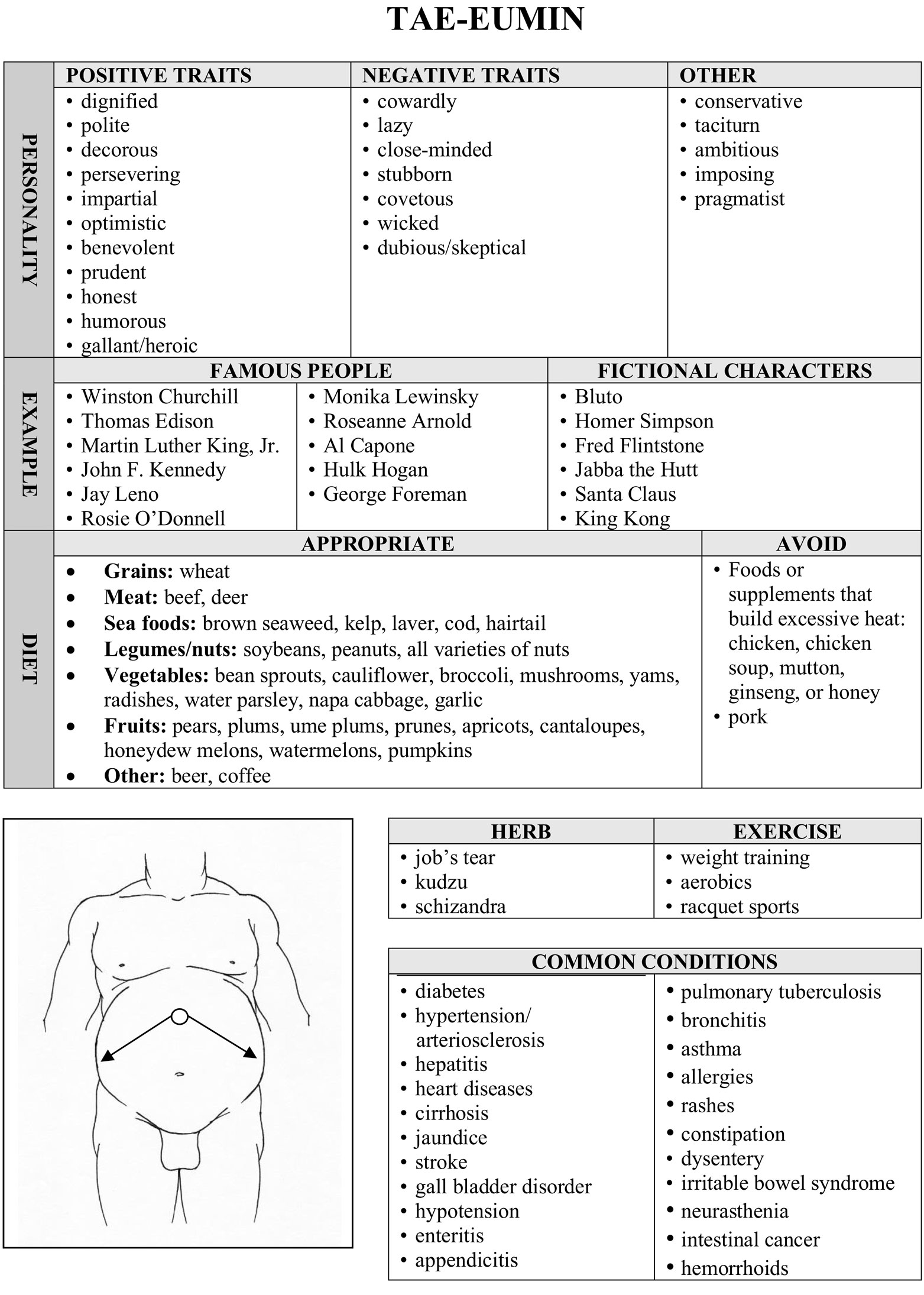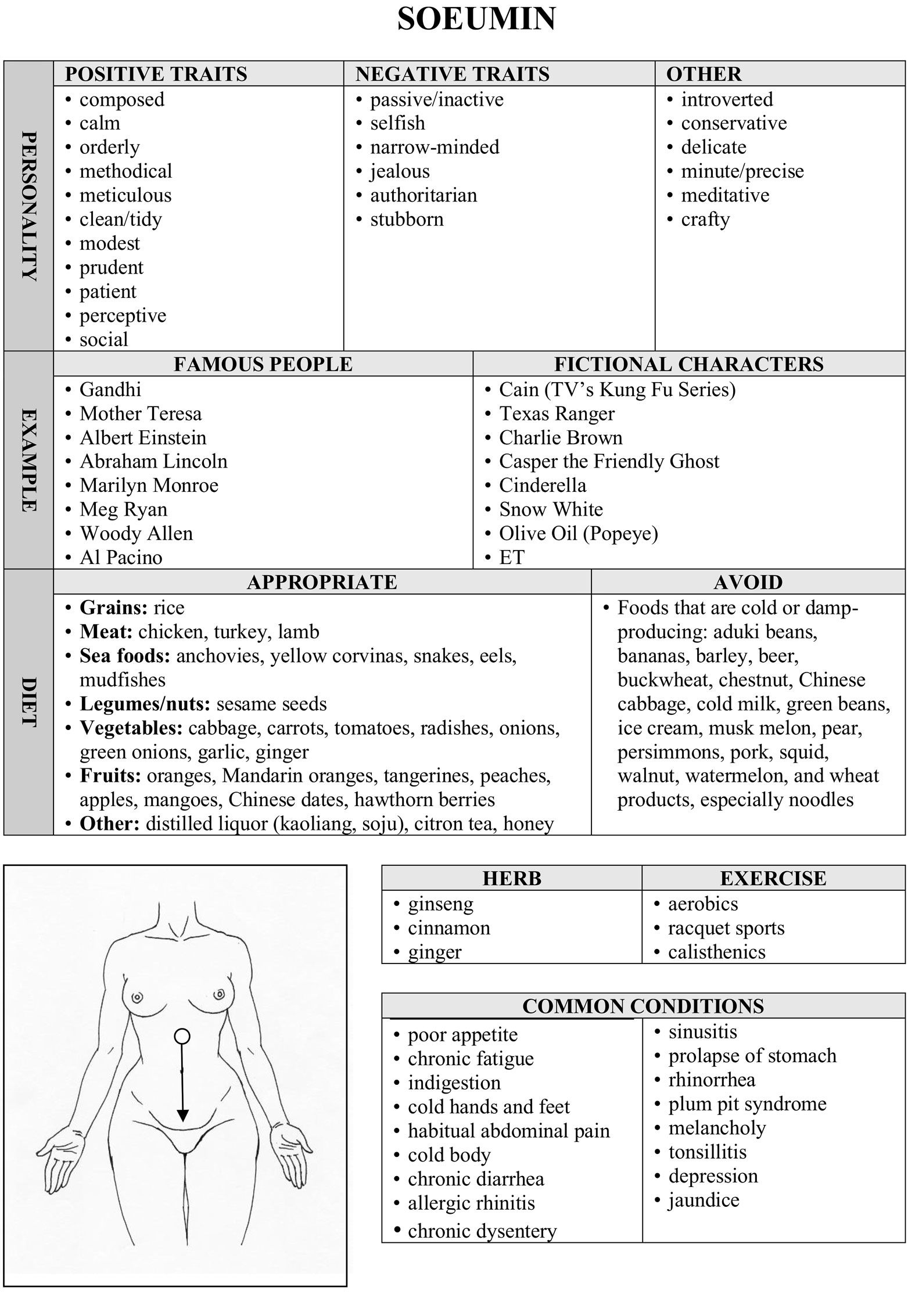Sasang Medicine (SM)
There are two major causes of disease: environmental factors and hereditary factors. Environmental factors include disease components that affect the body after birth. These are the external pathogenic factors of wind, cold, summer heat, dampness, dryness, and heat (inappropriate weather or invasion by germs), the seven emotional factors (stress), physical injury, lifestyle, diet, lack of exercise, etc. Hereditary factors are constitutional defects or deficiencies (hereditary diseases) that people are born with. In other words, people enter the world unbalanced and have disharmonies in their overall physiology.
In contrast to Western and traditional Chinese medicines, which stress eliminating environmental factors, SM believes in restoring balance by remedying hereditary factors. SM is the traditional constitutional medicine of Korea. Interest in this medical practice has surged since the idea became popular that diseases stem from defects in human genetic codes.
It seems obvious that patients who share common diseases, signs, and symptoms should receive similar treatments. Frequently, however, patients do not respond in the same way to the same treatments. For example, one patient may respond very well to a particular drug, while another experiences no relief and instead suffers severe side effects. This phenomenon, even when the doctor’s diagnosis and treatment method are correct, occurs because the doctor does not consider the hereditary factors of the patient.
Just as the face and the bodily shape of human beings are multifarious, people’s character traits and physiology also display great variety. SM classifies these variances in humans into Yin and Yang. The particularities of Yin and Yang determine whether a person is a Yin person or a Yang person. According to the Sasang principle of the I Ching, Yin persons are classified as either Tae-eumin or Soeumin, while Yang persons are categorized as Taeyangin or Soyangin. These four types make up the Sasang constitutions.
In SM, mental characteristics and a person’s physical form are regarded as inseparable, much like matter and energy are considered equivalent in modern physics. It is a fundamental principle in SM that a person’s physical form is linked to specific physiological and psychological traits. Therefore, one’s mental characteristics can be determined by physical shape and vice versa. Since SM focuses on identifying hereditary factors, the emphasis for determining a person’s constitution is more on the body’s shape than the more transient personality characteristics.
After diagnosing a body type, broad principles can be identified regarding the strengths and weaknesses of a patient’s characteristics, the excesses and deficiencies of internal organs, disease predispositions, treatment formulas, and health cultivation methods, all by the principles of Yin-Yang, Sasang, and the Five Elements. The broad principles are then further broken down into more specific treatment protocols concerning which environmental factors are causing the imbalances.
SM classifies not only herbs and diseases into Yin-Yang and Sasang but also analyzes human emotions (joy, anger, sadness, pleasure), bodily regions (head, shoulders, waist, buttocks), internal organs (lung, spleen, liver, kidneys), and sense organs (ears, eyes, mouth, nose). The energetic qualities of each element affecting human existence can be classified into the representative categories of Yin-Yang and Sasang.
COSMOS
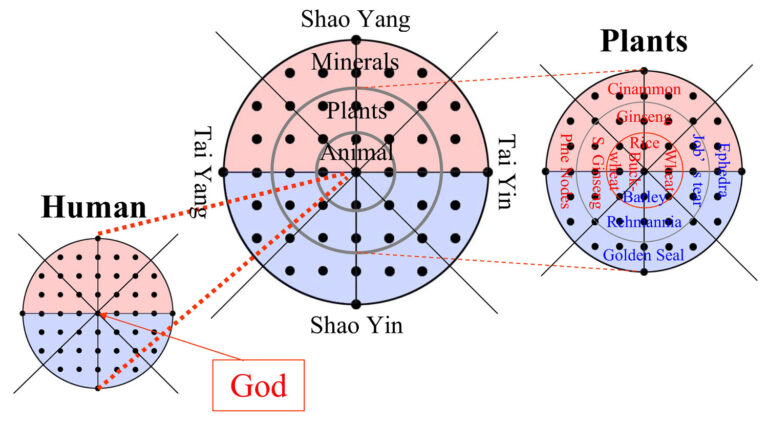
Explanation of the diagram: All things in nature have a tilt of Yin and Yang, which can be diagrammed onto the Sasang coordinates. The disease is a disharmony of Yin and Yang in the human body. The remedy lies in restoring balance using natural substances with the opposite Yin-Yang slant than that of the disease.
The four forces (Taiyang, Shaoyang, Taiyin, and Shaoyin) exist in all dimensions of fractal structure, the fundamental structure of the universe, and human beings. The balance between these forces is disrupted in human beings, leading to biased thoughts. This imbalance gives rise to desire and greed, resulting in sin and illness. Therefore, SM believes that human beings, with their disharmonious states of these fundamental four forces, commit sins and die of diseases predetermined from birth. God, in contrast, who has a harmonious state of these four forces, does not have any tilt in his thinking, so he loves all things in nature equally. He exists perpetually, as he has no diseases that an absence of physiological balance would cause. Psychological and physical treatments can harmonize the four forces. A person in perfect balance is called a “person of Yin-Yang harmony.”
Even if there is no outward expression of imbalance, people must constantly try to regulate the forces within them because the seed of self-destruction exists in all of us.
The following describes each of the four body types in SM.
Taeyangins
Taeyangins give off an image of pure masculinity regardless of their sex. They possess all the attributes of the so-called “he-man;” they are heroic, non-compromising, and have a brave spirit. They can be highly outspoken, rebellious, and arrogant. At the same time, Taeyangins are eccentric, creative, and revolutionary. Many in this constitution are often labeled geniuses. They can be outstanding strategists or inventors. Their weaknesses include insufficient planning, lack of regrets or reflection of failure, and becoming easily angered when things go wrong. Physically thin (few have large bodies) with large heads, Taeyangins are prone to a peculiar illness called Hae Yuk syndrome that manifests as lower body weakness as well as dysphagia or difficulty swallowing accompanied by vomiting.
Talent and aptitude: open, progressive, radical, skilled in communications and highly sociable.
Soyangins
Talent and aptitude: skilled at fulfilling work and roles given (this includes what is known as the “Heavenly decree” or spiritual calling, as well as everyday work) and has warrior instincts (brave and righteous, with a high sense of integrity).
Tae-eumins
The mention of the Tae-eumin type often evokes a mental image of magnanimity, impartiality, and benevolence. Tae-eumins tend to be taciturn and act with prudence, patience, and persistence in all matters. They are conservatives who dislike change. However, Tae-eumins can be wicked, arrogant, and greedy on the negative side. They have a dignified look but, at the same time, can frequently entertain thoughts of suspicion and doubt. Physically, many are overweight with a large frame and a big round “belly.” Corporate executives with stereotypical large potbellies often fall into this constitutional type. They are susceptible to diseases such as asthma, hypertension, stroke, and heart disease due to the weaknesses in their respiratory and circulatory systems.
Talent and aptitude: excellent at accomplishing and completing all projects. Whatever they start, they finish with an indomitable and unflagging spirit. They like ruts and can tenaciously remain in one location – residence, occupation, or social position – for long periods.
Soeumins
Talent and aptitude: decorous, composed, and skilled in gathering and organizing people. (Due to the fear and uncertainty toward the world, Soeumins try to find consolation by organizing others, especially family members, through kinship, regional relationships, or school relationships).
